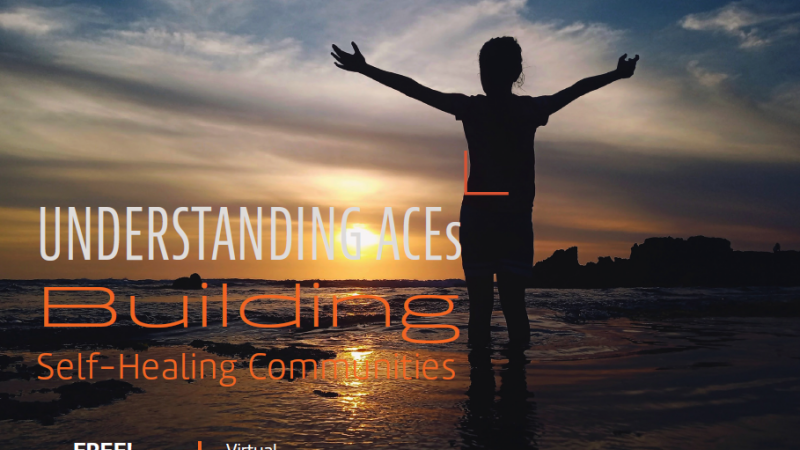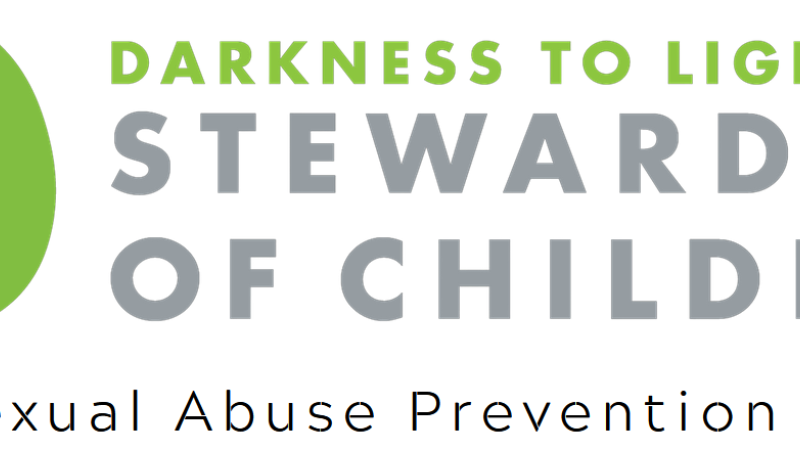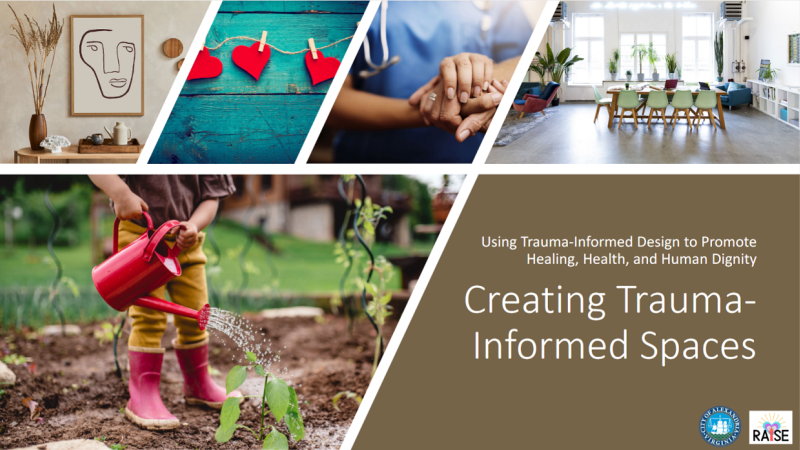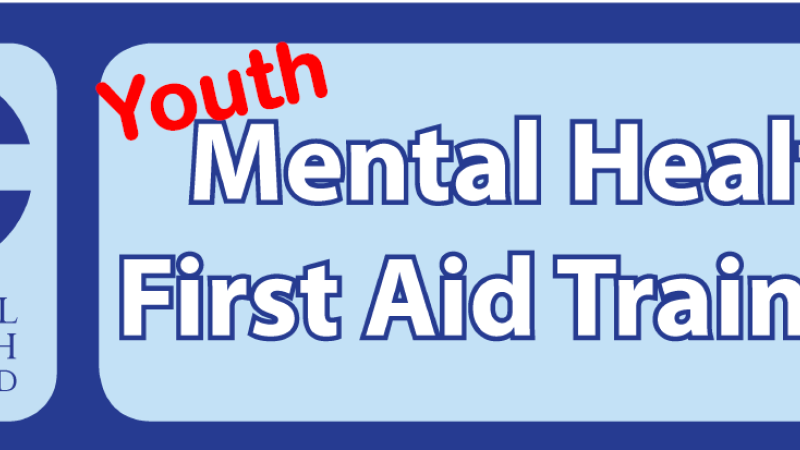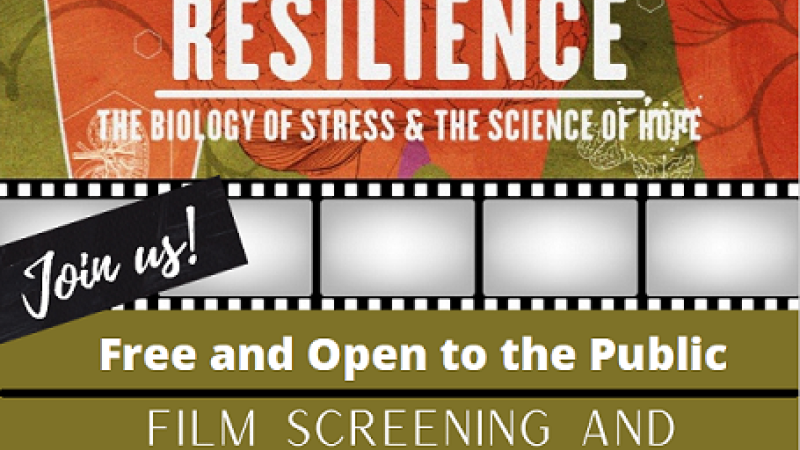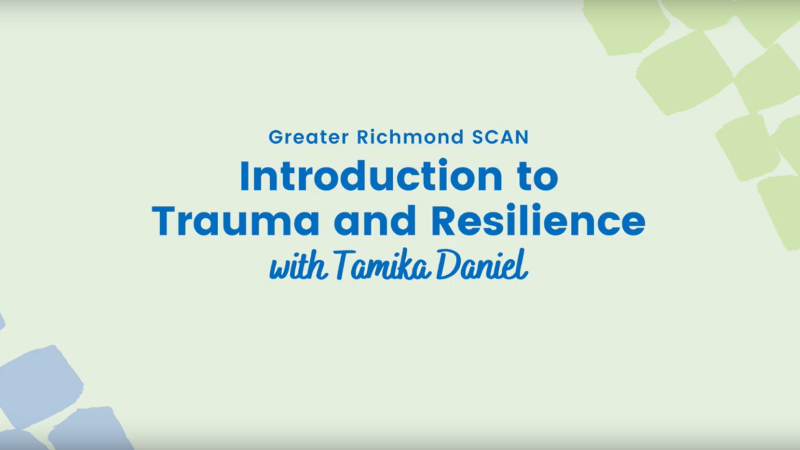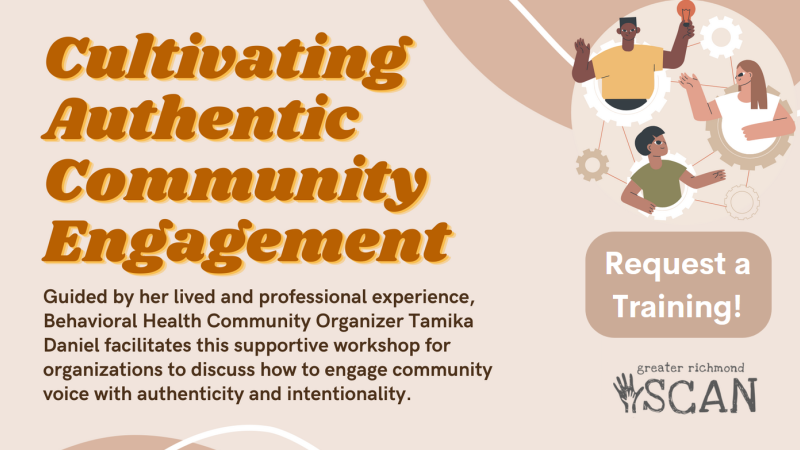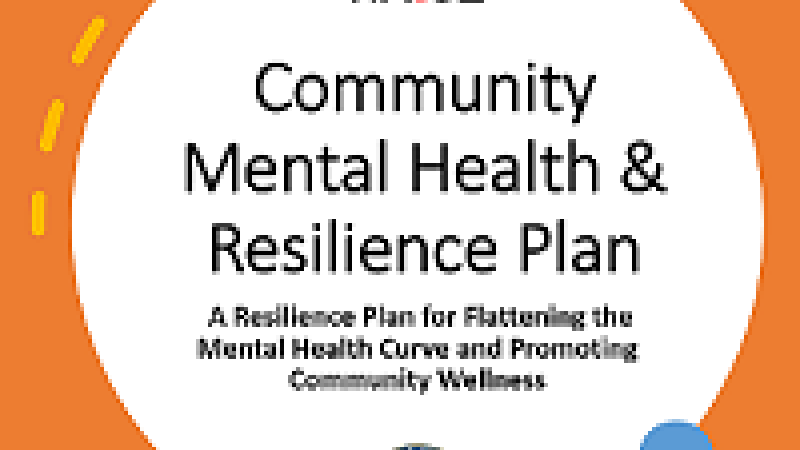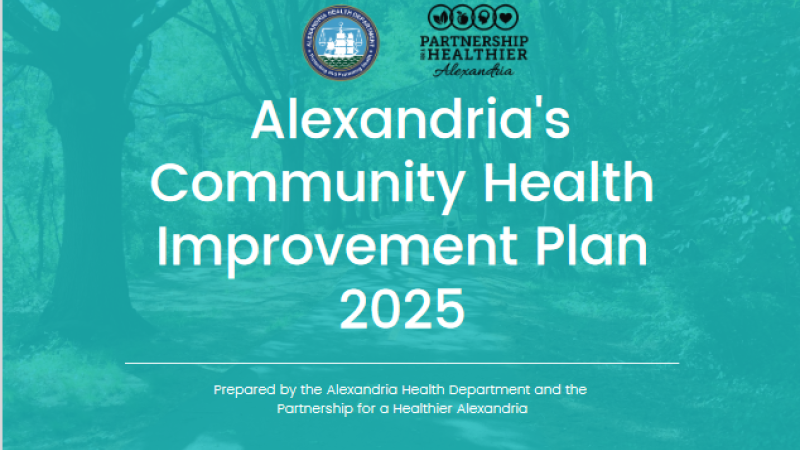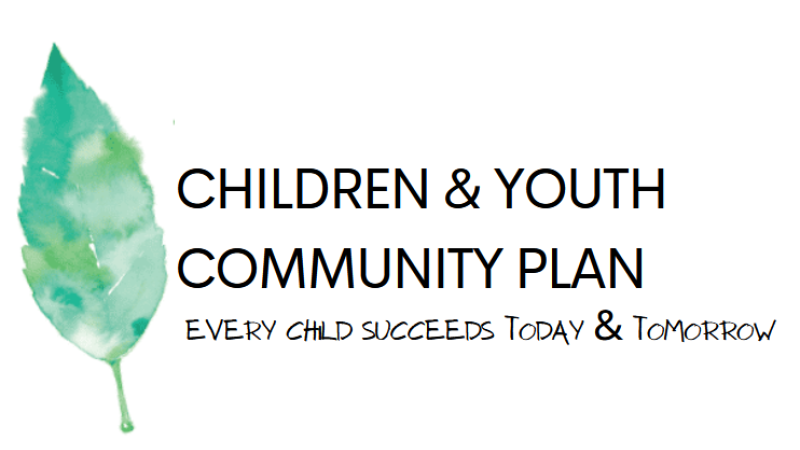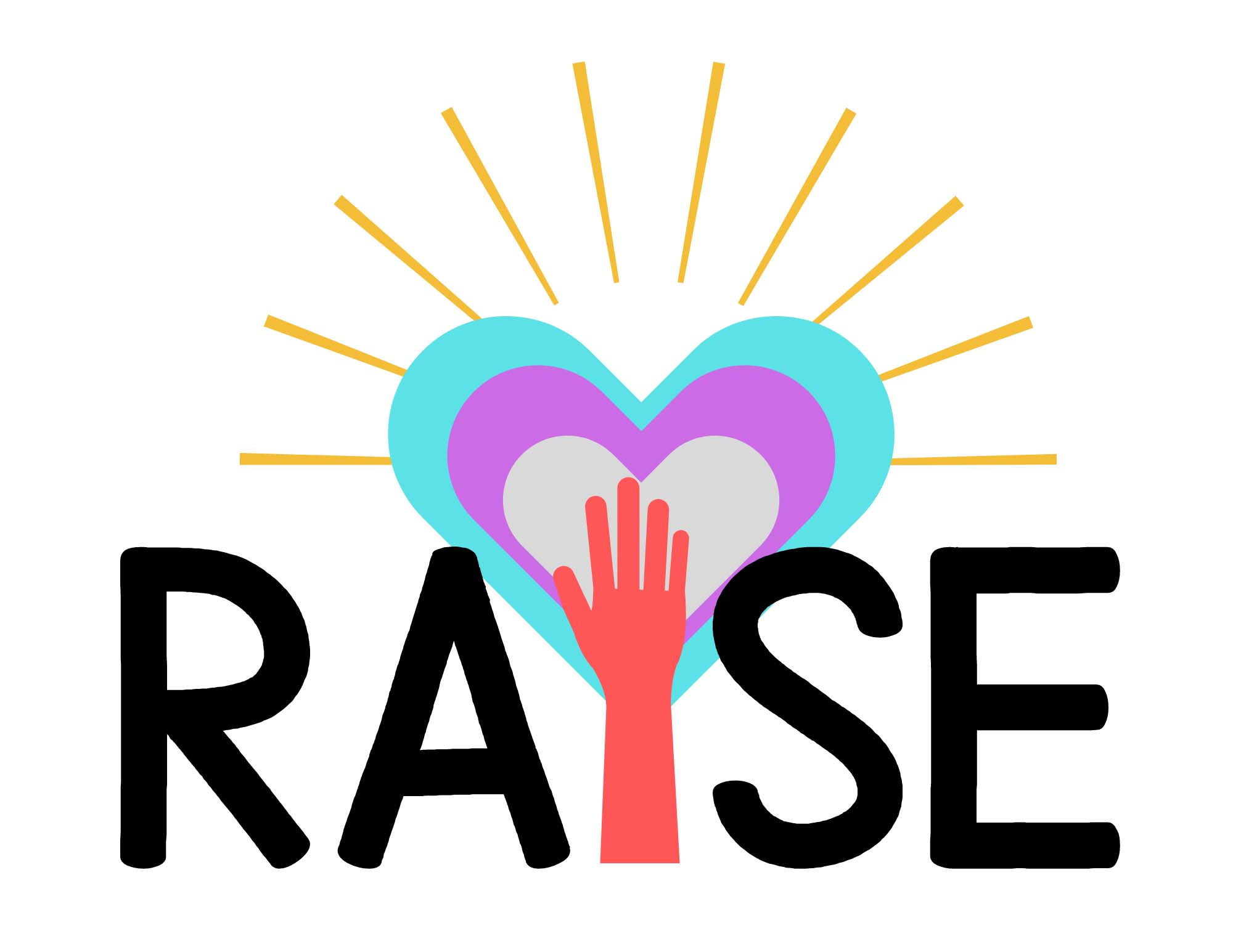
RAISE
*Please note: RAISE does not provide direct services to clients
RAISE: Alexandria's Trauma Informed Community Network

About Trauma-Informed Community Networks (TICNs)
About Trauma-Informed Community Networks (TICNs)

Throughout Virginia, there are more than 19 communities coming together across disciplines around trauma-informed care. Most often in Virginia, these groups form as trauma-informed community networks (TICNs). Every TICN looks different because they are built by the local community, however, in each of these communities, these networks share common characteristics:
- Build a stronger, more resilient trauma-informed community
- Increase awareness of trauma and adverse childhood experiences (ACEs) and identify areas that the group can collectively build upon
- Develop a shared language about trauma and resilience
- Help organizations to become trauma informed, conduct trainings, support, and implement new practices in schools, courts, and community services
- Create a mechanism for collaboration, and the sharing of information and resources
- And much more!
It should be noted that these networks, including RAISE, do not provide direct services to clients. Instead, TICNs help to connect practice across disciplines and help to identify gaps and how policies can be implemented. Virginia’s community networks play a key role in advancing trauma-informed policy and promoting a statewide policy agenda.
For more information about Virginia’s TICNs and the Campaign for a Trauma-Informed Virginia, visit the Voices for Virginia’s Children website at vakids.org.
About RAISE

Alexandria’s Trauma Informed Community Network (TICN) is located in Alexandria, Virginia. Established in July 2019, Alexandria’s TICN aims to build a more equitable, safe, trauma-informed and resilient Alexandria by informing, supporting and elevating our community. Hence its name, Resilience Alexandria: Inform. Support. Elevate. (RAISE)
RAISE Mission, Priorities, Committees, & Accomplishments
Mission
To build a more trauma-informed and resilient Alexandria by informing, supporting and elevating our community.
Priorities
RAISE members were asked to use their lived experience and expertise to identify sources of trauma that are specific to Alexandria. Based on those sources, four following priorities drive RAISE’s mission:
- Inform Alexandria’s community and various sectors about RAISE and its mission to build a more trauma-informed and resilient Alexandria;
- Support community members and professionals by delivering trainings focused on ACEs, trauma, and resilience, and
- Support organizations becoming trauma-informed by providing them with technical assistance in transforming their spaces, policies, and procedures; and finally
- Elevate our community’s needs and voice through advocacy at the micro and macro levels.
RAISE Committees
These priorities and RAISE’s current capacity resulted in the following committees which guide RAISE’s strategic direction:
- Member Engagement and Wellness Committee: Supports existing efforts that aim to promote community wellness and resiliency among RAISE members and the greater community.
- Changing Environments and Cultures Committee: Helps teams and organizations create a trauma-informed culture by providing them with technical assistance in transforming their spaces, policies, and procedures.
- Justice Advocacy Committee: Supports community members and professionals by delivering trainings focused on ACEs, trauma, and resilience, and elevates our community’s voices by advocating for justice and advancing policies that dismantle systems that perpetuate racial trauma and inequity
Each of these subcommittees have developed their own action plans that will guide future work and evaluate progress.
Past Accomplishments
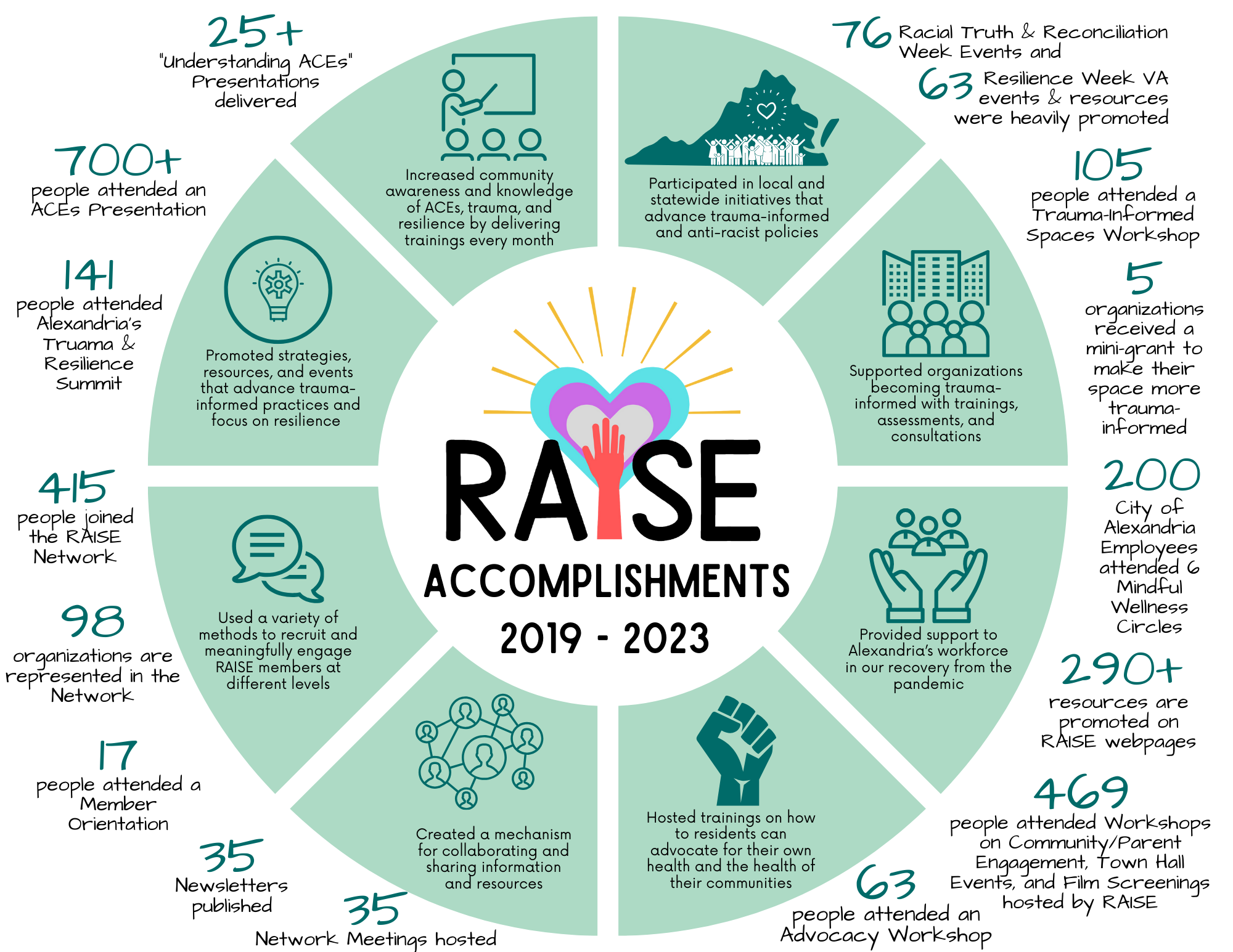
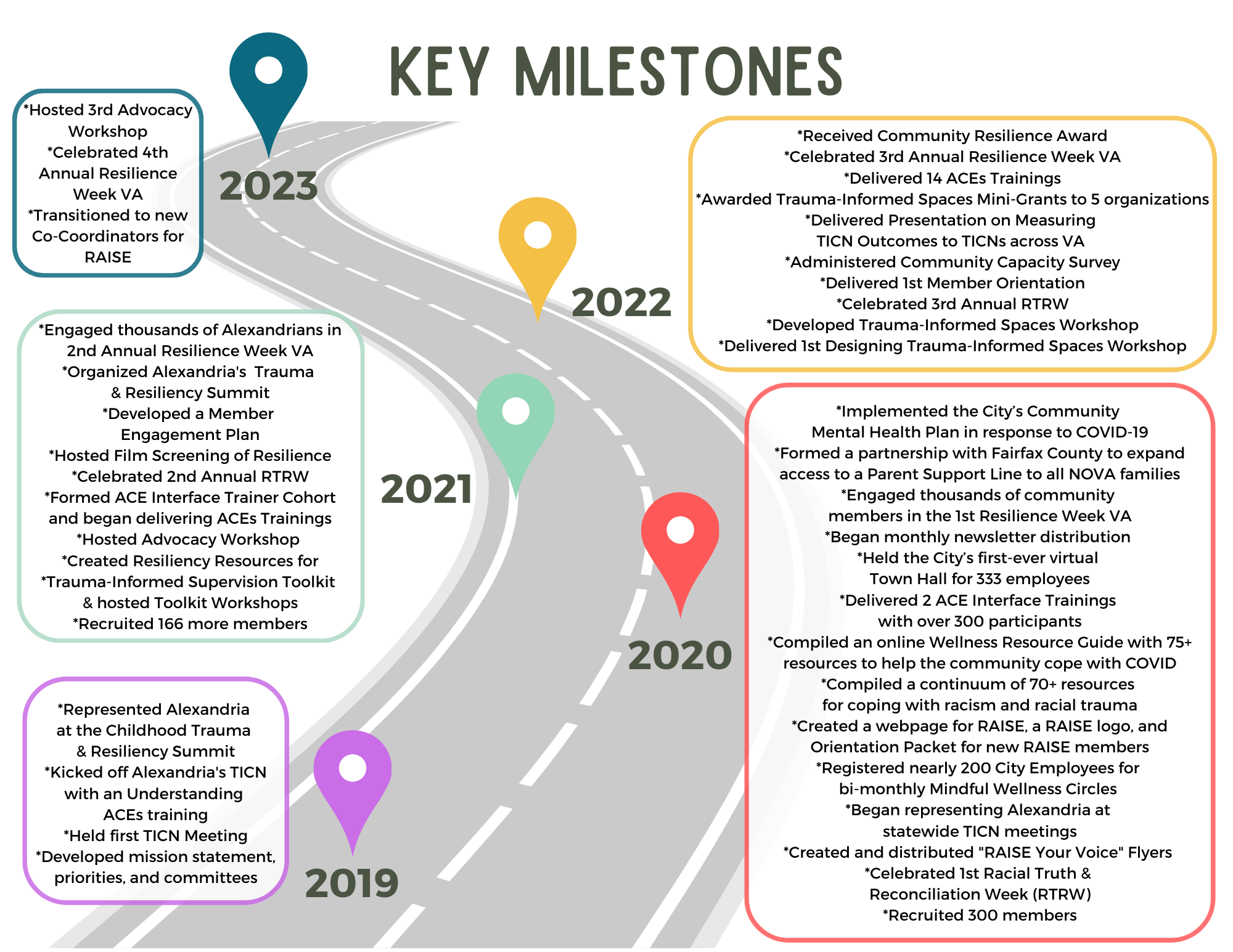
Progress on Building a More Trauma-Informed & Resilient Community
In 2021, Alexandria celebrated the release of its second Children and Youth Community Plan (CYCP), a blueprint for improving outcomes for children who call Alexandria home. Every month, the City’s Department of Community and Human Services publishes a “Children and Youth Community Plan Report Card” that engages the public on the progress of the CYCP. Each Report Card helps tell the unique story about Alexandria’s children and youth. RAISE coordinates the Plan's strategy to "Create a more trauma-informed and resilient Alexandria by informing, supporting, and elevating our community." View the PDF version of the 2023 Report Card on Community Resilience.
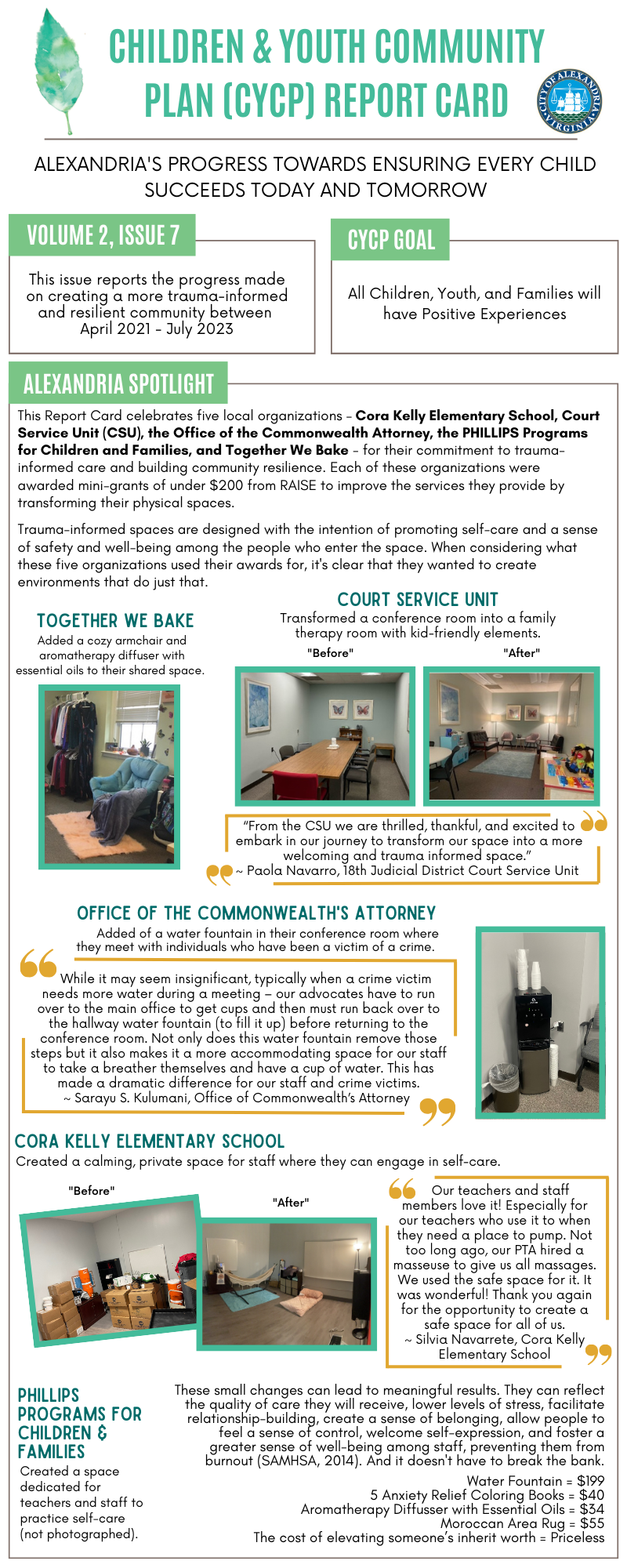
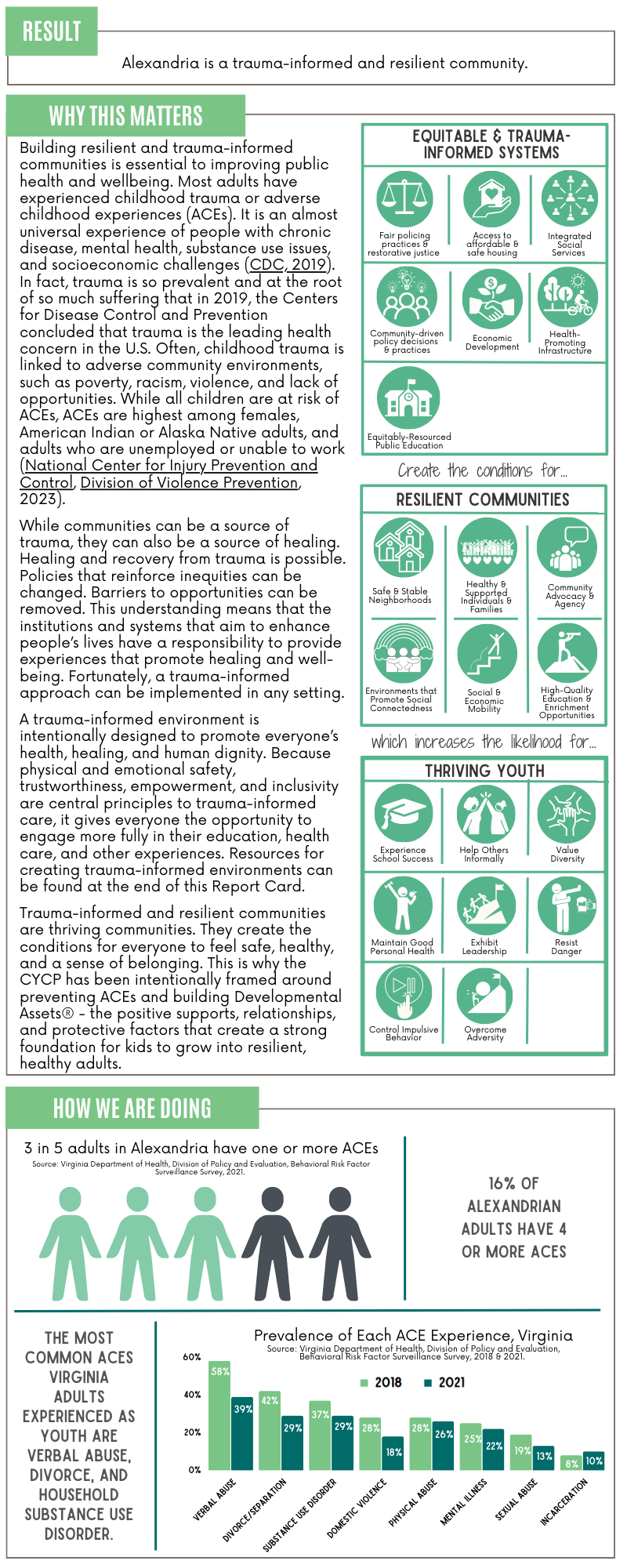
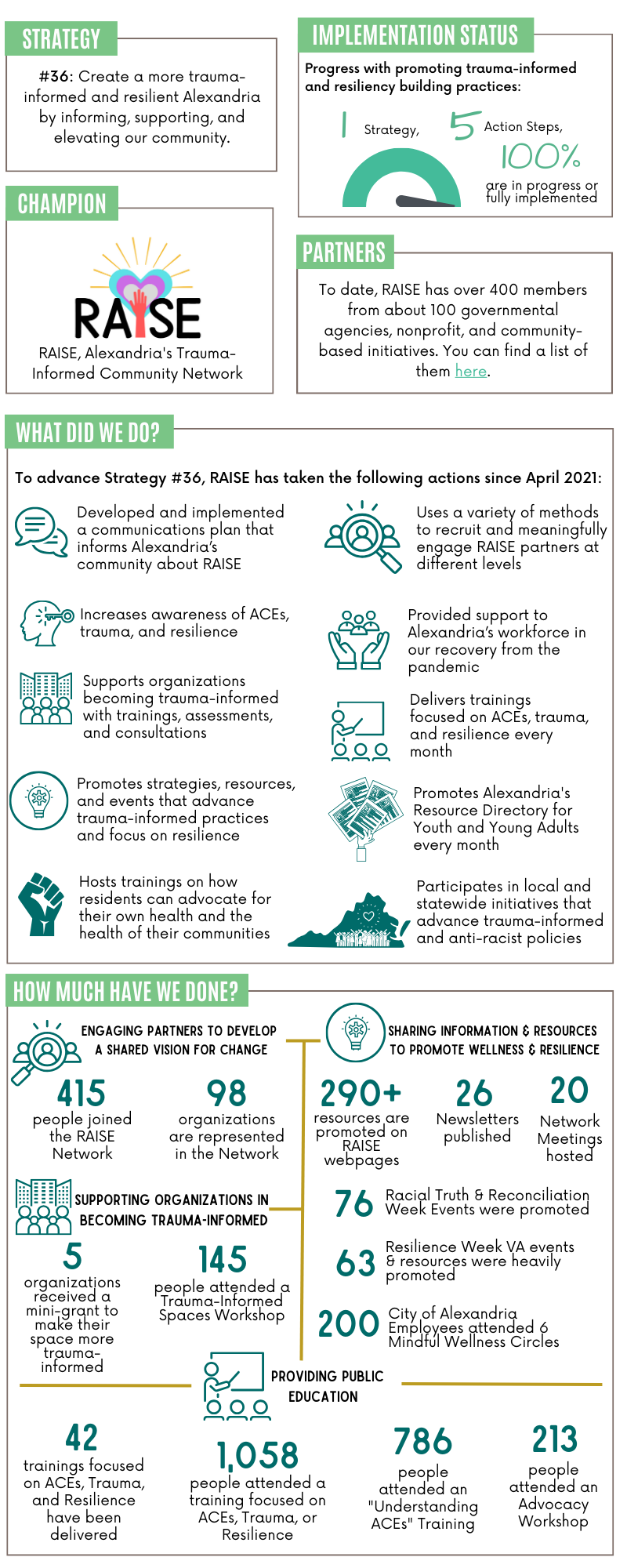
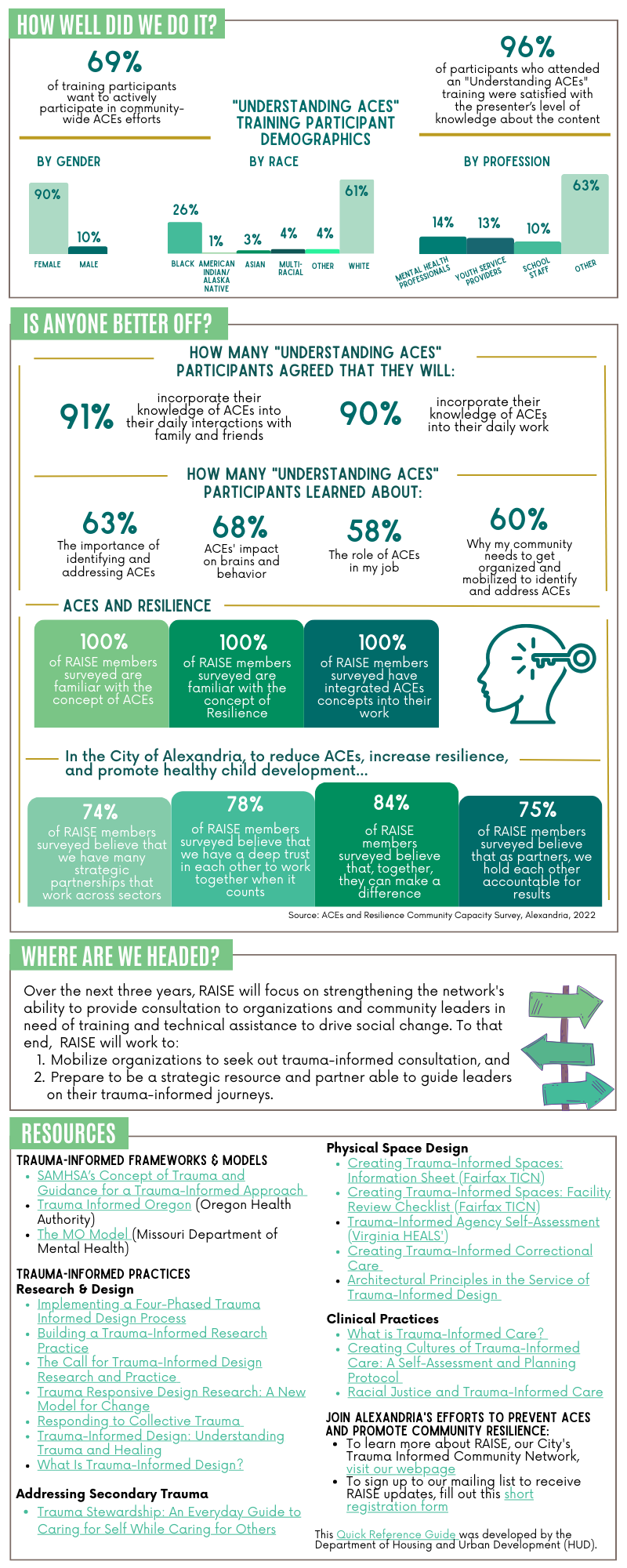
Mailing List, Meetings, Orientations, and Events
Mailing List
To sign up to our mailing list to receive RAISE updates, fill out this short registration form.
Network Meetings
Network Meetings provides members an opportunity to hear about and share trauma-informed efforts taking place across the city and state; receive policy updates from the General Assembly, make decisions, and collaborate on shared work. To find out about upcoming meeting dates, contact Leah Fraley at LFraley@scanva.org and Nathaniel Lewis at nathaniel.lewis@vdh.virginia.gov.
Free Trainings, Workshops, and More!
Take a look at a menu of trauma-informed and prevention trainings that are available upon request, free of charge!
Volunteer Needs
Roles, Responsibilities, & Time Commitments
Volunteering for RAISE is a great way to gain leadership experience, volunteer or internship hours, knowledge of Alexandria's systems, initiatives, and trauma champions, and friends! There is a role for all ages, backgrounds, lived experiences, sectors, staff position levels, etc. Training and ongoing support is provided. Any one of these roles can be made into an internship or capstone project. If interested in learning more, contact Leah Fraley at LFraley@scanva.org and Nathaniel Lewis at nathaniel.lewis@vdh.virginia.gov.
Volunteer Needs/Positions
- Committee Co-Chairs (Need: 2)
- Responsibilities: Help plan and facilitate committee meetings and activities that are in alignment with Committee Action Plans. Contribute to member engagement, and more. Encourage and support the collection of data to identify needs and monitor on-going performance of the Committee. Oversee progress with the implementation of the Committee's Action Plan and report on the Committee's progress. Collaborate on the design and implementation of new initiatives set by the Committee, center equity in all decisions, and ensure that strategic decisions made are in alignment with the overall strategic goals of RAISE. Help manage the "day-to-day" operations that keep the Committee moving forward and on track, including member engagement, communications, data collection and analysis, and other administrative tasks. Identify and cultivate emerging leaders in RAISE. Attend monthly Steering Committee meetings and quarterly educational events and Network Meetings. To learn more about each Committee, see the "Committee" section of the page.
- Approximate Time Commitment: ~2-4 Hours/month
- Communications Specialist (Need: 1-2)
- Responsibilities: Serve as a bridge to the greater community by maintaining and enhancing communication practices and platforms that engage community members, raise awareness, share information, and cultivate motivation. Assist with the implementation of the Member Engagement Plan, the development of the RAISE eNewsletter every month, a RAISE promotional video, the creation of flyers, brochures, and other marketing material, and lead efforts that support the annual Resilience Week VA campaign. Attend quarterly Network Meetings and monthly Steering Committee Meetings.
- Approximate Time Commitment: 3-6 hours/month
- Training & Events Coordinator (Need: 1)
- Responsibilities: Help plan and organize monthly trainings, educational experiences, film screenings, and special events.
- Approximate Time Commitment: 2-4 hours/month
- Grant Coordinator (Need: 1)
- Responsibilities: Help build RAISE's capacity to create a more trauma-informed and resilient community by coordinating efforts to obtain grants and funding. Seek out funding opportunities, analyze Request for Proposals, write grant proposals and narratives, and prepare required reports. Provide project management, ensuring that project stakeholders have reviewed and provided feedback on proposals in a timely manner, and obtaining final approval.
- Approximate Time Commitment: 0-1 million hours/month
- Committee Member (Need: Unlimited)
- Responsibilities: Committees are at the heart of RAISE and bring ideas to life. RAISE has three Committees and each has their own Action Plan that helps to achieve the mission of RAISE. Committee members have professional and/or lived experience, are genuinely interested in advancing racial equity, building resilience, raising awareness of the impacts of trauma and ACEs, and creating trauma-informed environments, and are action-oriented "doers" who commit to attending meetings, educational experiences, and carrying out tasks.
- Approximate Time Commitment: 2-4 hours/month
City-Wide Strategic Plans for Creating Self-Healing Communities
Resources
Resources for Building Resilience
- Resilience Week VA 2020 Resources:
- 20 Ways to Build Resilience at Home: For grown-ups | For kids
- 50 Ways to Build Resilience: Mindful Mondays | Trauma-Informed Tuesdays | Whimsical Wednesdays | Tranquility Thursdays | Friendly Fridays | Self-Care Saturdays | Sanctuary Sundays
-
Ways to Practice: Health of Mind, Body, & Spirit | Connection | Diversity, Equity, & Inclusion | Happiness & Play | Kindness & Gratitude (Graphics)
-
Resilience Week VA 2023 Resources
-
Ways to Reconnect, Reset, and Recharge (Graphics)
-
Youth Resources
Resources to Help Children and Youth Heal in the Wake of Traumatic Events
These supports, available in both English and Spanish, were compiled by the National Research Center of Hispanic Children and Families and developed by national organizations including The National Child Traumatic Stress Network, the American Psychological Association, and the Child Mind Institute.
- Resources for Parents and Caregivers
- Helping Children Cope With Frightening News | Cómo ayudar a los niños a afrontar noticias alarmantes
- Helping Teens with Traumatic Grief: Tips for Caregivers | Ayuda Para Los Adolescentes Con Duelo Traumático
- After a Crisis: Helping Young Children Heal | Después De Una Crisis: Cómo Sanan A Los Niños
- Creating Supportive Environments When Scary Things Happen | Creando Ambientes de Apoyo Cuando Suceden Hechos Alarmantes
- Talking to Children When Scary Things Happen | Hablando con los Niños Cuando Sucede La Violencia
- Talking to Teens When Violence Happens | Hablando con los Adolescentes Cuando Sucede la Violencia
- Age-Related Reactions to a Traumatic Event | Reacciones A Eventos Traumaticos Relacionadas Con La Edad
- Helping Your Children Manage Distress in the Aftermath of a Shooting | Cómo Ayudar A Sus Hijos Tras Los Tiroteos En Los Centros De Educación
- Parent Guidelines for Helping Youth After the Recent Shooting | Guía Para Los Padres Para Ayudar A Los Jóvenes Después De Un Tiroteo Reciente
- How to Talk to Kids About School Shootings | Ansiedad por los tiroteos en las escuelas
- Resources for Educators
- General Resources
- Helping Children Cope After a Traumatic Event | Cómo ayudar a los niños a lidiar con un evento traumático
- Helping Children Cope with Grief | Cómo ayudar a los niños a enfrentar el duelo
- Quick Guide to Post-Traumatic Stress Disorder (PTSD) | Guía rápida sobre el trastorno de estrés postraumático
- Managing your distress in the aftermath of a shooting | Manejando tú angustia después de los tiroteos
- Well-being Practices: Gentle Reminders for Times of Stress | Prácticas para el Bienestar: Breves Recordatorios para Tiempos de Estrés
Race Based Trauma Resources and Support in Times of Civil Strife
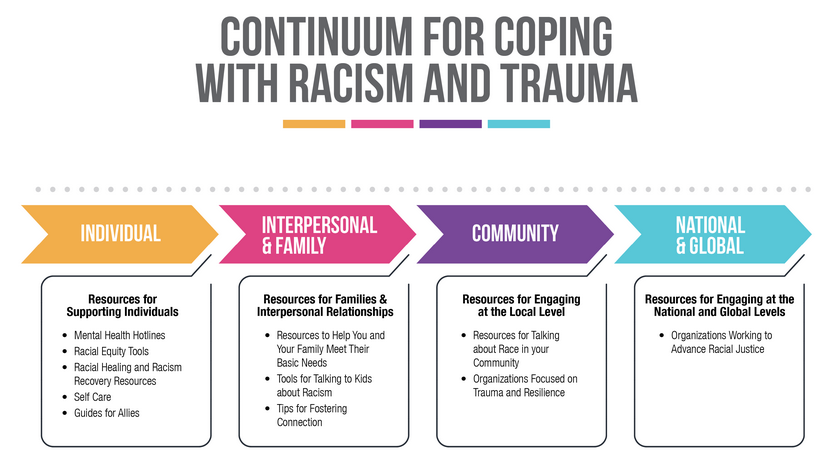
Chronic stress can have negative side effects on everyone. Psycho-social factors, specifically, pervasive exposure to racism and discrimination, create an additional daily stressor for people of color. Research shows this to be particularly true for African-Americans (APA, 2016). Race Based Trauma Resources and Support in Times of Civil contains a continually growing list of resources for and information related to coping with racism and trauma on individual, interpersonal and family, community and national and global levels.
Grief and Loss Resources
Full Circle Grief Center, based in Richmond, Virginia, provides support for grieving children, families, adults, and communities through support groups, individual counseling services, remembrance programs, and grief education support.
- Allyson English Drake presented A Journey through Grief to RAISE in October 2020 and shared these resources on Grief Journaling and Journaling for Healing with the network.
- The Center has curated a Resource Library that offers a comprehensive array of resources for children, teens, adults, families, and individuals of all ages.
- Full Circle has also compiled a list of Books and Websites for children, teens, adults, counselors, and those grieving the loss of a pet, child, miscarriage, sibling, or loved one.
- The Full Circle staff created a 2022 Bereavement Resource Manual as a free resource to the community
- Conversations about Grief is a series of pre-recorded educational programs hosted by Full Circle with the goal of increasing the community conversation about death, dying, and loss.
Guides and Toolkits for Implementing Trauma-Informed Practices
- Trauma and Equity Lens from Fairfax TICN
- Resiliency Toolkit and Resources Supervisors to Support their Employees
- Roadmap to Trauma-Informed Care by Trauma-Informed Oregon
- Helping Traumatized Children Learn and Creating and Advocating for Trauma-Sensitive Schools from the Massachusetts Advocates for Children and Harvard Law
- Key Ingredients for Successful Trauma-Informed Care Implementation from the Center for Health Care Strategies
- NCTSN Child Welfare Trauma Toolkit
- SAMHSA Concept of Trauma and Guidance for a Trauma Informed Approach
- Trauma-Informed Child Welfare Practice from the Center for Advanced Studies in Child Welfare
Resources for Creating Trauma-Informed Environments
For Trauma-Informed Organizations
- Creating Trauma-Informed Spaces: Information Sheet (Fairfax TICN)
- Creating Trauma-Informed Spaces: Facility Review Checklist (Fairfax TICN)
- Trauma-Informed Agency Self-Assessment (Virginia HEALS')
For Trauma-Informed Supervision
Resources for Coping with COVID and Uncertainty
Coping with COVID Resources
Resiliency Resources For Supervisors
- A toolkit designed to help supervisors and their staff understand the mental health impact of COVID-19 and challenges associated with returning to the workplace.
COVID Specific Resources from Fairfax TICN:
- Trauma Informed Supervision During COVID-19, April 7, 2020
- Navigating Telework, April 2, 2020
- TICN March Message, March 31, 2020
- Self Care, March 19, 2020
- COVID-19 Special Edition, March 16, 2020
Handouts and Flyers
- RAISE One-Pager
- Adverse Community Environments vs. Trauma-Informed and Equitable Systems - What causes poor health and behavioral outcomes among youth? What do resilient communities look like? What does it mean for a young person to "thrive"? This infographic explains!
- Trauma Fact Sheet
- A Guide to Educating Children, Youth, and Families About Trauma and Resilience
- Trauma and Resilience Tree
- Mini Mandalas
- Raise Your Voice to Help Neighbors at Risk of Abuse : How to recognize signs of abuse in children and adults. View or download the flyer in English, Spanish, Amharic or Arabic and share with your network.
- Parenting Support Line (703.324.7720). Anyone, no matter their immigration status, can call and receive help.

ACEs and Trauma Research
- ACE Study
- ADHD and Child Traumatic Stress
- Effects of Trauma on Health Fact Sheet
- Trauma-Informed Child Welfare Practice
- Adverse Community Environments vs. Trauma-Informed and Equitable Systems - What causes poor health and behavioral outcomes among youth? What do resilient communities look like? What does it mean for a young person to "thrive"? This infographic below explains!
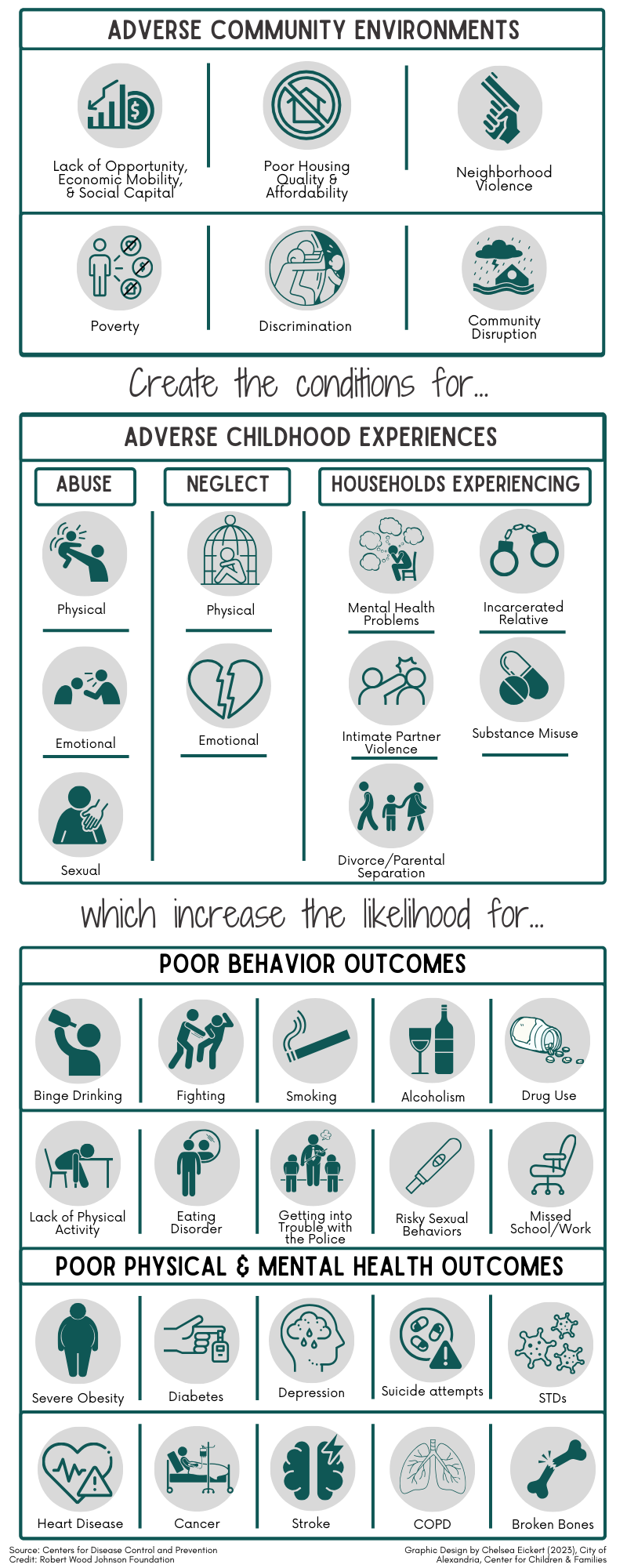
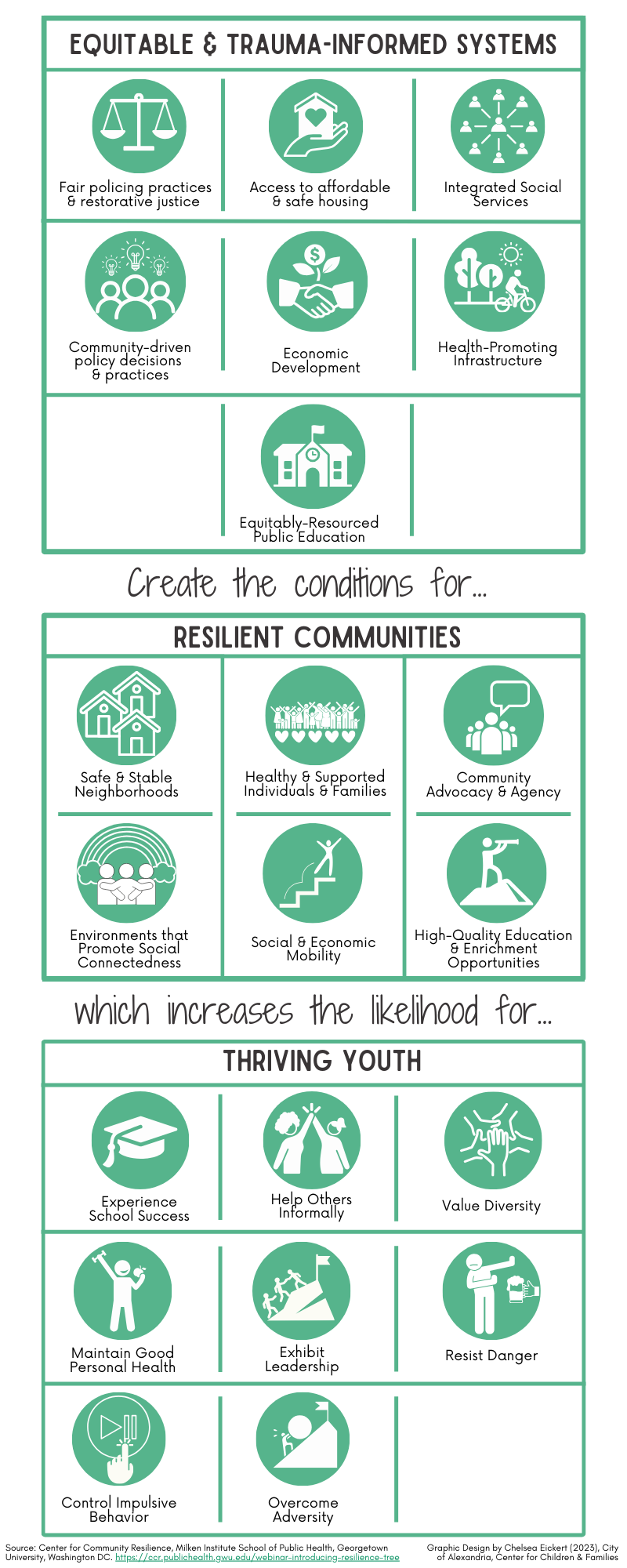
Videos
LGBTQ+ Resources

The Alexandria LGBTQ+ Task Force is a space where LGBTQ+ people and allies gather quarterly to network, share ideas, and plan training and community events. The goal of the Task Force is to create safe and inclusive service provision to LGBTQ+ people in the City of Alexandria. Check out their list of resources for people who identify as LGBTQ+
RAISE Meeting Agendas & Materials
2023
2022
RAISE Members
The members that make up the RAISE Network hail from the following organizations:
Advocacy
Animal Adoption and Welfare
Arts, Recreation, and Cultural Activities
Education
Early Childhood Education and Care
- Child & Family Network Centers
- Early Childhood Wellness Program
- Higher Horizons
- Kids First Years
- Parent Infant Education Program
K-12
- Alexandria City Public Schools
- Arlington Public Schools
- Caroline County Public Schools
- Charles City Public Schools
- Communities in Schools of NOVA and Petersburg
- Comstock Public Schools
- Fairfax County Public Schools
- Page County Public Schools
- Prince William County Schools
Post-Secondary Education
Faith-Based
Family Services
- Arlington/Alexandria Court Appointed Special Advocates
- Center for Alexandria's Children
- Children's Services Act
- Child Welfare Division
- Formed Families Forward
- National Center for Missing and Exploited Children
- Northern Virginia Family Services
- Phillips Programs for Children and Families
- SCAN of NoVA
Government
Housing and Homeless Services
Social Services
Information Services
LGBTQ+
Mental and Behavioral Health
Philanthropy
Public Health, Healthcare, & Wellness
Public Safety, Courts, & Legal Services
Workforce Training and Development
Contact Information
RAISE Email: RAISE@alexandriava.gov
RAISE Co-Coordinators
Leah Fraley, SCAN of Northern Virginia
LFraley@scanva.org
Nathaniel Lewis, Alexandria Health Department
nathaniel.lewis@vdh.virginia.gov
